
You can enter the water without swimming, but you can’t swim unless you enter the water. Likewise, you can live together without being married, but if you are common law married, sharing a residence is an implied prerequisite — you have to enter the water. Not all states recognize common law marriages, but among those that do, the requirement that spouses must live together is inferred. But this alone won’t make you common law married.
By definition, a common law marriage is one where two individuals present themselves to the public as spouses, even though they never took out a marriage license or engaged in a ceremony. The criteria for this type of marriage is that you live as spouses would. You might introduce yourselves as husband and wife. You may have bought your home together and you’re raising a family together, but you’ve done so without a marriage license. If you live in separate residences, a court might not agree that you’re common law married and grant you the same legal rights that other married couples enjoy. But neither is a court likely to consider you common law married if you move in with your boyfriend or girlfriend and never tell anyone you consider yourselves to be married.
States that recognize common law marriages, and where living together without actually haven’t taken out a marriage license or engaged in a wedding can result in certain legal claims, include:
- Alabama
- Colorado
- Iowa
- Kansas
- Montana
- Oklahoma
- Rhode Island
- South Carolina
- Texas
- Utah
- District of Columbia
Some states recognized common law marriages before changing their laws, so common law unions have been grandfathered in to some extent. Georgia recognizes common law marriages that began before 1997, and Idaho recognizes those that were entered into before 1996. In Ohio, you’re still common law married if your union began prior to 1991. Pennsylvania changed its law effective January 1, 2005. In at least one state that recognizes this type of union –Texas — the court will not recognize a common law marriage after you stop living together if neither you nor your spouse file a proceeding with the court within a year after breaking up to establish that a common law marriage existed.
Determining whether you’re common law married is generally only a legal issue if the marriage ends or one spouse dies. There’s no such thing as a “common law divorce” – you must end your marriage through the court system in the same way you would if you had taken out a marriage license and committed to each other in a ceremony. If you can’t reach an agreement about property or debts acquired while you were together, a judge will decide the issue. The same goes for issues of spousal support, child support and custody.
If you live in one of these states, you may be considered legally married regardless of whether you formalized the union. You or your spouse may have certain inheritance rights or rights to property or support if you divorce. If your marriage is ending, speak with a local attorney to find out where you stand.
